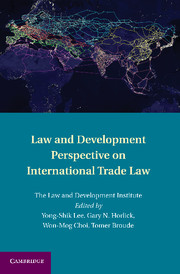Book contents
- Frontmatter
- Contents
- About the Editors and Authors
- Acknowledgments
- Law and development perspective on international trade law
- Introduction
- Part I Developing Countries and International Trade
- Part II Law and Development in the World Trade Organization
- Part III Law and Development in Free Trade Agreements
- Part IV Law and Development in Regional Initiatives
- 13 Islands of Prosperity and Poverty
- 14 Trade Preferences and Economic Growth
- 15 Economic Development of North Korea
- 16 Applying the “Specificity” Test in Countervailing Duty Cases in the Context of China's Foreign Investment Policies
- 17 Nonconclusions
- Epilogue
- Index
- References
16 - Applying the “Specificity” Test in Countervailing Duty Cases in the Context of China's Foreign Investment Policies
from Part IV - Law and Development in Regional Initiatives
Published online by Cambridge University Press: 05 August 2011
- Frontmatter
- Contents
- About the Editors and Authors
- Acknowledgments
- Law and development perspective on international trade law
- Introduction
- Part I Developing Countries and International Trade
- Part II Law and Development in the World Trade Organization
- Part III Law and Development in Free Trade Agreements
- Part IV Law and Development in Regional Initiatives
- 13 Islands of Prosperity and Poverty
- 14 Trade Preferences and Economic Growth
- 15 Economic Development of North Korea
- 16 Applying the “Specificity” Test in Countervailing Duty Cases in the Context of China's Foreign Investment Policies
- 17 Nonconclusions
- Epilogue
- Index
- References
Summary
Introduction
In constructing subsidy and countervailing duty (CVD) laws, the most difficult task is to distinguish between “legitimate” government activities on one hand, and trade distorting subsidies on the other. The difficulty can be inherent in light of the divergent views on the role of government involvement with industry and on the industrial policies of developing countries. At present, the World Trade Organization (WTO) Agreement on Subsidies and Countervailing Measures (SCM) adopts the specificity requirement, which allows countervailing actions against government programs that aid local enterprises or industries in any manner that would harm foreign industries.
- Type
- Chapter
- Information
- Law and Development Perspective on International Trade Law , pp. 376 - 394Publisher: Cambridge University PressPrint publication year: 2011



